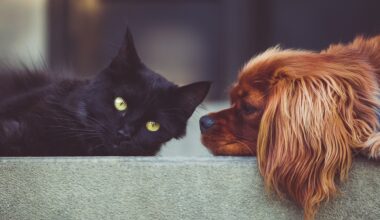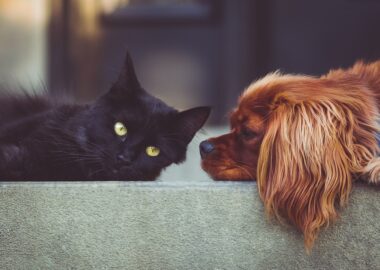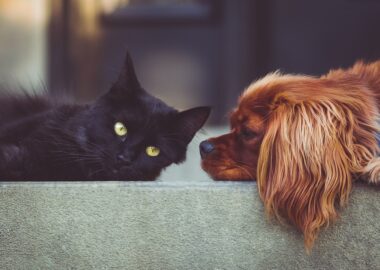How to Create a Routine that Supports Dog Socialization with Other Pets
Socializing dogs around other pets is vital for their overall development, ensuring they are well-adjusted and can interact positively with various creatures. To establish an effective routine, start by introducing your dog to other pets gradually. This can be done during regular walks or playdates, where they can get comfortable around each other in a controlled environment. Consistency is critical; aim for daily interactions, ensuring that each experience remains positive. Make sure to observe your dog’s behavior closely during these encounters, as this will provide you with insights into their comfort level. Remember, dogs can be creatures of habit, so predictability in scheduling interactions helps them acclimate to new experiences. If your dog exhibits fear or aggression, it’s crucial to seek assistance from a professional trainer or behaviorist. Create a list of traits and behaviors of the pets your dog will meet, such as size and temperament, to ensure compatibility. Additionally, prepare treats and toys to foster positive associations during these meetings. With patience and determination, your efforts will lead to a robust support system for your dog.
Providing adequate training is another essential step in building positive socialization routines for dogs. Incorporating commands such as “sit,” “stay,” and “come” enhances communication between you and your dog during interactions. Training sessions should occur before socialization events, using positive reinforcement techniques consistently. Gradually introduce your dog to various animals, starting with calm and friendly pets, to help reduce anxiety in your dog. Take note of your dog’s body language; signs of stress should be taken seriously. Be prepared to retreat if your dog becomes uncomfortable. Utilize dog parks or community events designed for pets, ensuring they’re selected based on your dog’s abilities and social skills. Try attending group training classes, as they often provide a structured environment to practice social behaviors among other dogs and their owners. Always reward your dog for good behavior when engaging with other pets. To keep things engaging, vary the pets and settings where socialization occurs, as this will provide fresh experiences. This diversity in encounters keeps progress steady while reducing the likelihood of fearful responses. Remember to stay patient throughout this journey, as building confidence in your dog could take time.
Monitoring Interactions
Monitoring interactions plays a crucial role in ensuring that dog socialization around other pets develops smoothly. Always supervise your dog during these sessions, especially in the beginning stages. Carefully observing how your dog reacts to different animals allows you to gauge their comfort and social skills in various situations. Assess how your dog approaches other pets, taking note of their reactions and making adjustments when necessary. If your dog shows any signs of aggression or fear, remove them from the situation immediately to prevent negative associations from forming. Gradually desensitize your dog by making interactions shorter and less intense initially. Additionally, be mindful of the environment, as a calm space will facilitate better socialization. The aim is to foster positive experiences while encouraging good behavior during these encounters. Document and review your dog’s progress over time, noting what works well and what adjustments may be needed. This reflective practice will help create a more tailored socialization routine that meets your pet’s specific requirements. Familiarize yourself with common dog behavior signals so you can intervene appropriately and ensure the safety of all animals involved.
Incorporating play into your dog’s socialization routine is also highly beneficial. Engaging in activities such as fetch or tug-of-war with other pets helps to reinforce social bonds while providing an excellent outlet for energy. When your dog plays with others, ensure the other pets are compatible in terms of size and temperament. Small dogs might feel threatened by larger dogs, while more assertive breeds may intimidate more timid companions. Alternate the settings where these play sessions occur; visiting different parks or open spaces will expose your dog to various environments, allowing them to adapt more easily. Schedule playdates regularly within a familiar group of pets, as this reduces anxiety by establishing a known routine. During these sessions, monitor your dog closely, using toys to redirect overexcitement or aggressive behaviors when necessary. Building trust and teamwork among pets is essential; this way, they learn to respect each other’s space while enjoying their time together. Finally, remember that the ultimate goal of socialization is to create well-rounded dogs capable of adapting to any situation they might encounter while being around other animals.
Positive Reinforcement
Your dog’s socialization routine should heavily rely on positive reinforcement strategies. To successfully encourage desired behaviors during interactions with other pets, rewards like treats, praise, and toys play a significant role. As your dog performs desirable behaviors around other animals, continually reinforce these actions by rewarding them immediately. This immediate feedback helps solidify the connection between positive behavior and rewards. Implement varied reinforcement types, including both tangible rewards and verbal praise to maintain excitement. You may also use clicker training as an effective way to mark good behavior and further increase your dog’s understanding of what is expected from them. Make sure to reward not only when your dog plays nicely but also during calmer interactions. This will help establish a balanced approach to play and relaxation time, preparing your dog for diverse scenarios. Remember that socialization should be enjoyable for your dog; hence, avoid forcing situations that induce stress. Keeping sessions short and engaging ensures mutual enjoyment, and thereby promotes positive associations with other pets. Over time, your consistent reinforcement efforts will yield a more confident and sociable dog, capable of navigating various interactions with ease.
Attending events specifically designed for pet socialization can greatly enhance your dog’s experience. Dog-friendly gatherings, meetups, and training classes provide valuable environments for practicing social behaviors around other pets. These events typically attract dogs and pet owners interested in similar activities, forming a network of support and fun experiences. Research various pet-based community events within your area and make a calendar of proposed dates to help maintain consistent socialization. When attending these activities, make sure to familiarize your dog with the surroundings. Help them acclimate to new noises, scents, and sights before introducing them to other pets. Exercising patience during these outings is crucial; rewarding your dog for maintaining calmness in the presence of others will reinforce positive behaviors. Don’t hesitate to take breaks during events if your dog becomes overwhelmed, allowing them to recharge before re-engaging. Additionally, encourage friendly interactions with other pets through structured playing sessions or small training exercises that involve other dogs. Participating in these events fosters a sense of community while reinforcing a positive social experience for your dog.
Setting Boundaries and Rules
Establishing boundaries and rules is essential to foster healthy interactions between your dog and other pets. Clear guidelines help your dog understand what is expected of them, reducing confusion during social encounters. Begin by defining personal boundaries for both your dog and other pets, ensuring that everyone involved feels safe. Use consistent commands and cues, training your dog to respect personal space and avoid overwhelming interactions. For instance, instruct your dog to “leave it” if they get too close to a pet that displays signs of discomfort. These commands help create a sense of security while promoting appropriate behavior. Ensure all the pets in your socialization circle respect each other’s space, especially during meal times or when toys are involved. Teach your dog to share, gradually introducing them to various resources to promote sharing and patience. In socialization routines, consistency is crucial; continuously reinforce these boundaries through positive feedback. Engaging in dialogue with other pet owners about each pet’s boundaries is also necessary, allowing for collaborative efforts in reinforcing desired behavior. Strong boundaries lead to an overall harmonious socialization experience for your dog and contribute to building a supportive network.
Persistence and patience pave the way for effective dog socialization routines around other pets. Understand that not every interaction will be successful, and setbacks may occur. Remaining resilient through these ups and downs is crucial to building your dog’s social confidence. Celebrate small victories, whether it’s allowing your dog to approach another pet or playing nicely without aggression. Acknowledge that socialization is a gradual process; as such, each dog learns at their pace. Adjust your expectations accordingly and be prepared to adapt your approach based on your dog’s behavior over time. As your dog starts to demonstrate comfort around other pets, gradually increase the duration and complexity of social interactions. Make use of positive reinforcement strategies to continue motivating them while building and instilling positive associations in their social experiences. Importantly, connect with fellow dog owners and share your experiences; they can provide valuable insights and support. Together, you can all encourage healthy socialization days for your pets. Over time, you’ll witness your dog transform into a well-socialized companion, confidently navigating diverse social environments.





